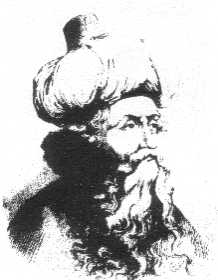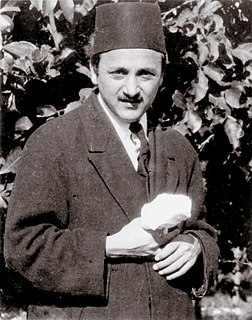A Quote by Ibn Arabi
Each person is oriented toward a quest for his personal invisible guide, or . . . he entrusts himself to the collective, magisterial authority as the intermediary between himself and Revelation.
Related Quotes
Bahá'u'lláh is not the Intermediary between other Manifestations and God. Each has His own relation to the Primal Source. But in the sense that Bahá'u'lláh is the greatest Manifestation to yet appear, the One Who consummates the Revelation of Moses; He was the One Moses conversed with in the Burning Bush. In other words Bahá'u'lláh identifies the glory of the Godhead on that occasion with Himself. No distinction can be made amongst the Prophets in the sense that They all proceed from One Source, and are of One Essence. But Their stations and functions in this world are different.
He who asks to receive his daily bread does not automatically receive it in its fullness as it is in itself: he receives it according to his own capacity as recipient. The Bread of Life (cf. Jn. 6:35) gives Himself in His love to all who ask, but not in the same way to all; for He gives Himself more fully to those who have performed great acts of righteousness, and in smaller measure to those who have not achieved so much. He gives Himself to each person according to that person's spiritual ability to receive Him.
When each citizen submits himself to the authority of law he does not thereby decrease his independence or freedom, but rather increases it. By recognizing that he is a part of a larger body which is banded together for a common purpose, he becomes more than an individual, he rises to a new dignity of citizenship. Instead of finding himself restricted and confined by rendering obedience to public law, he finds himself protected and defended and in the exercise of increased and increasing rights.
As Lucretius says: 'Thus ever from himself doth each man flee.' But what does he gain if he does not escape from himself? He ever follows himself and weighs upon himself as his own most burdensome companion. And so we ought to understand that what we struggle with is the fault, not of the places, but of ourselves
Saying that, he was suddenly himself again, despite his lunatic hair and eyes: a man whose personal dignity went so deep as to be nearly invisible... It was more than diginity. Integrity? Wholeness? Like a block of wood not carved. The infinite possibility, the unlimited and unqualified wholeness of being of the uncommitted, the nonacting, the uncarved: the being who, being nothing but himself, is everything.
Revelation is necessarily limited to the first communication- after that it is only an account of something which that person says was a revelation made to him; and though he may find himself obliged to believe it, it can not be incumbent on me to believe it in the same manner; for it was not a revelation made to ME, and I have only his word for it that it was made to him.







































